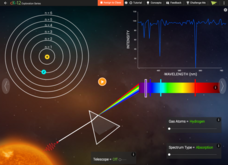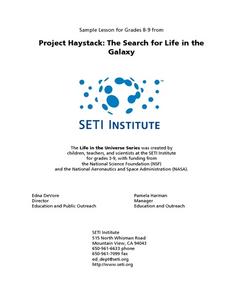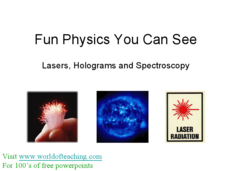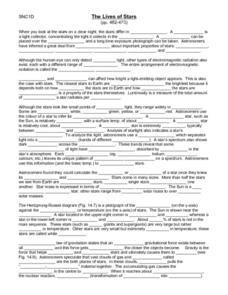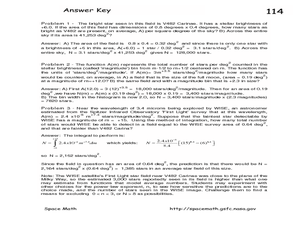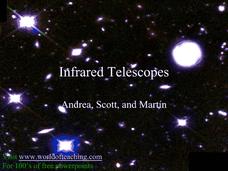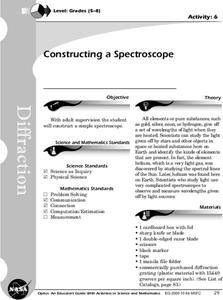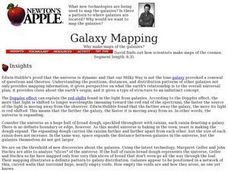Curated OER
Stellar Fingerprints: the Spectra of Stars
Students explain how an element can be identified using emission spectra. They relate the emission spectrum of hydrogen to its absorption spectrum and identify hydrogen absorption lines in the spectrum of stars.
Curated OER
Astronomy
A broad sampling of material related to stars is covered here. You will want to review each question to see if it corresponds to your curriculum. The formatting is inconsistent, but easily corrected if you use the information to create...
CK-12 Foundation
Atomic Colors
Stars are too hot to visit, so how do we know what different stars are made of? An enlightening simulation uses a spectrum graph to show the various electron emission and absorption reactions. Scholars experiment with both helium and...
Curated OER
How Long Would It Take To Travel To the Stars?
Students consider the amount of time that it would take to get to the star, Sirius using various modes of transportation, some practical and some whimsical. The practicality of physically going to another star system is explored in this...
Curated OER
Spectral Lines
Slides and slides of emission spectra bring this topic to light for your physics class! Exited electrons returning to lower energy levels is offered as the cause of emission spectra. In summary, viewers learn that we can determine the...
Curated OER
Fun Physics You Can See
Fascinating aspects of electromagnetic radiation and its use in obtaining and transferring information are described here. Learners will find the connections to current technology interesting. Although the slides are text-heavy, they do...
Curated OER
How Many Stars in the Milky Way?
Students perform an experiment in which they will use a statistical method called `sampling' to count to a billion (and beyond). Students practice sampling by estimating the number of characters on a page from the classified section of a...
Curated OER
The Lives of Stars
In this stars worksheet, students review what makes up a star, how astronomers learn about stars, and the different types of stars including low mass and high mass stars. This worksheet has 62 fill in the blank statements.
Curated OER
Tools of Modern Astronomy
Learners describe the electromagnetic spectrum and astronomy. In this astronomy lesson students complete an activity, predict what will happen and complete a worksheet.
Curated OER
Unraveling the Mysteries of Objects in Space
Learners study emitted and absorbed light, and label each type of spectrum. They identify elements by their spectral signatures and use a spectroscope.
Curated OER
Exploring Power-Law Functions Using WISE Data!
In this power-law functions worksheet, students solve 3 problems using data from the Wide-field Infrared Survey Experiment in the constellation Carina. Students use a photograph to determine the number of stars as bright as the brightest...
Curated OER
F(x)g(x): A Tale of Two Functions
In this graphing functions worksheet, students solve four problems where they graph given functions, find the sum related to the area under the curve and determine an integral.
Curated OER
Hertzsprung-Russell Diagram
Students examine the relationship between temperature and brightness. In this astronomy lesson students will correlate the evolution of stars to the HR diagram plotted.
Curated OER
Stellar Spectroscopy
Students investigate white light. In this science lesson, students participate in a variety of experiments in which they study light. Students use spectroscopes to view the components of light.
Curated OER
Infrared Telescope
Most of the twenty slides in this presentation include photographs or diagrams, making it an eye-catching way to teach about infrared telescopes. The pros and cons of using infrared light to study outer regions of space are explained....
Curated OER
Chandra X-Ray Observatory
Students tour Chandra's top galactic X-ray images. In this Chandra X-Ray Observatory instructional activity, students play games and complete puzzles based on the Chandra Mission and X-Ray Astronomy. Students listen to pod casts,...
Curated OER
How Do We Know?
Students investigate the history of astronomy and how the study of constellations has evolved since the dawn of ancient civilization. They conduct research using a variety of resources. The teacher uses demonstrations to model how the...
Curated OER
How Do We Know...?
High schoolers identify and explain how various inventions and astronomers have improved our appreciation of the universe. Students identify at least two constellations in the sky and discuss how they were used in ancient times to tell...
Curated OER
Spectroscopy Demonstrations
Students study light and see what emits photons and that light can be separated onto a spectrum. In this energy and matter instructional activity students identify gases using a spectrum chart.
Curated OER
Constructing a Spectroscope
Students construct a simple spectroscope. They observe the emission spectrum produce by a source of light.
Curated OER
Color Recognition
Students envision how space observatories make use of monochromatic filters to collect data on the color of objects in space. They see the actual colors of objects when they are in monochromatic light.
Curated OER
Integrating Physics-Atomic Fingerprints
In this atomic fingerprint worksheet, learners read about the Bohr model and electrons changing energy levels and emitting energy. They answer questions about the atomic spectrum and the fingerprints for specific atoms.
Curated OER
Galaxy Mapping
Students research the constellations and discuss their findings. Then they construct their own maps of the galaxy using paper, black paint, aluminum foil, etc. They make a 3-D map of their chosen constellation.
Curated OER
Photometry
Students examine blackbody radiation and light wavelengths. Students research the various types of electromagnetic spectrum. Students examine any misconceptions they may have in light.




